
-
 Trump says comedian Colbert should be 'put to sleep'
Trump says comedian Colbert should be 'put to sleep'
-
Mahrez leads Algeria to AFCON cruise against Sudan

-
 Southern California braces for devastating Christmas storm
Southern California braces for devastating Christmas storm
-
Amorim wants Man Utd players to cover 'irreplaceable' Fernandes

-
 First Bond game in a decade hit by two-month delay
First Bond game in a decade hit by two-month delay
-
Brazil's imprisoned Bolsonaro hospitalized ahead of surgery

-
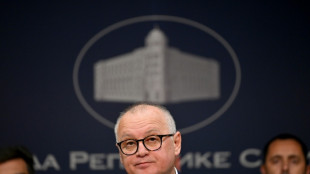 Serbia court drops case against ex-minister over train station disaster
Serbia court drops case against ex-minister over train station disaster
-
Investors watching for Santa rally in thin pre-Christmas trade

-
 David Sacks: Trump's AI power broker
David Sacks: Trump's AI power broker
-
Delap and Estevao in line for Chelsea return against Aston Villa

-
 Why metal prices are soaring to record highs
Why metal prices are soaring to record highs
-
Stocks tepid in thin pre-Christmas trade

-
 UN experts slam US blockade on Venezuela
UN experts slam US blockade on Venezuela
-
Bethlehem celebrates first festive Christmas since Gaza war

-
 Set-piece weakness costing Liverpool dear, says Slot
Set-piece weakness costing Liverpool dear, says Slot
-
Two police killed in explosion in Moscow

-
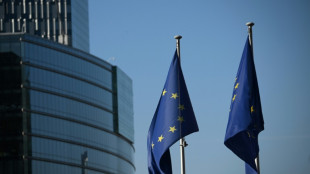 EU 'strongly condemns' US sanctions against five Europeans
EU 'strongly condemns' US sanctions against five Europeans
-
Arsenal's Kepa Arrizabalaga eager for more League Cup heroics against Che;sea

-
 Thailand-Cambodia border talks proceed after venue row
Thailand-Cambodia border talks proceed after venue row
-
Kosovo, Serbia 'need to normalise' relations: Kosovo PM to AFP

-
 Newcastle boss Howe takes no comfort from recent Man Utd record
Newcastle boss Howe takes no comfort from recent Man Utd record
-
Frank warns squad to be 'grown-up' as Spurs players get Christmas Day off

-
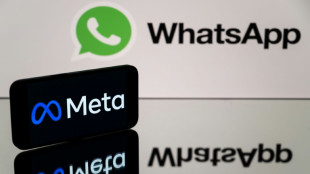 Rome pushes Meta to allow other AIs on WhatsApp
Rome pushes Meta to allow other AIs on WhatsApp
-
Black box recovered from Libyan general's crashed plane

-
 Festive lights, security tight for Christmas in Damascus
Festive lights, security tight for Christmas in Damascus
-
Zelensky reveals US-Ukraine plan to end Russian war, key questions remain
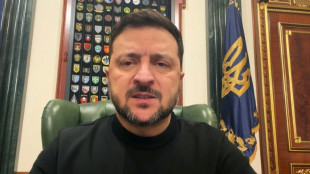
-
 El Salvador defends mega-prison key to Trump deportations
El Salvador defends mega-prison key to Trump deportations
-
Stranger Things set for final bow: five things to know

-
 Grief, trauma weigh on survivors of catastrophic Hong Kong fire
Grief, trauma weigh on survivors of catastrophic Hong Kong fire
-
Asian markets mixed after US growth data fuels Wall St record

-
 Stokes says England player welfare his main priority
Stokes says England player welfare his main priority
-
Australia's Lyon determined to bounce back after surgery

-
 Stokes says England players' welfare his main priority
Stokes says England players' welfare his main priority
-
North Korean POWs in Ukraine seeking 'new life' in South

-
 Japanese golf star 'Jumbo' Ozaki dies aged 78
Japanese golf star 'Jumbo' Ozaki dies aged 78
-
Johnson, Castle shine as Spurs rout Thunder

-
 Thai border clashes hit tourism at Cambodia's Angkor temples
Thai border clashes hit tourism at Cambodia's Angkor temples
-
From predator to plate: Japan bear crisis sparks culinary craze

-
 Asian markets mostly up after US growth fuels Wall St record
Asian markets mostly up after US growth fuels Wall St record
-
'Happy milestone': Pakistan's historic brewery cheers export licence

-
 Chevron: the only foreign oil company left in Venezuela
Chevron: the only foreign oil company left in Venezuela
-
US denies visas to EU ex-commissioner, four others over tech rules
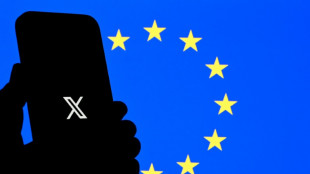
-
 SMX Is Being Valued By Monetizing Certainty, Not Sustainability Narratives
SMX Is Being Valued By Monetizing Certainty, Not Sustainability Narratives
-
SMX Is Earning Validation, and Valuation, Through Industrial Proof, Not Promises

-
 SMX's Valuation Is Anchored in Fixing a Structural Supply-Chain Failure Markets Learned to Ignore
SMX's Valuation Is Anchored in Fixing a Structural Supply-Chain Failure Markets Learned to Ignore
-
2026 Payer IT Outsourcing Outlook: Outcome-Based Managed Services, Production-Grade GenAI Governance, and Vendor-Risk Enforcement

-
 Gold's Quiet Molecular-Level Reckoning Is Happening Outside the Spotlight
Gold's Quiet Molecular-Level Reckoning Is Happening Outside the Spotlight
-
SMX Is Transitioning From Single Deployments to Supply-Chain Infrastructure

-
 Each SMX Partnership Opens a Market, the Portfolio Multiplies the Value
Each SMX Partnership Opens a Market, the Portfolio Multiplies the Value
-
CORRECTION: Nextech3D.ai Provides Shareholder Update on Krafty Labs Acquisition and Announces $321,917 CEO Investment


US researchers seek to legitimize AI mental health care
Researchers at Dartmouth College believe artificial intelligence can deliver reliable psychotherapy, distinguishing their work from the unproven and sometimes dubious mental health apps flooding today's market.
Their application, Therabot, addresses the critical shortage of mental health professionals.
According to Nick Jacobson, an assistant professor of data science and psychiatry at Dartmouth, even multiplying the current number of therapists tenfold would leave too few to meet demand.
"We need something different to meet this large need," Jacobson told AFP.
The Dartmouth team recently published a clinical study demonstrating Therabot's effectiveness in helping people with anxiety, depression and eating disorders.
A new trial is planned to compare Therabot's results with conventional therapies.
The medical establishment appears receptive to such innovation.
Vaile Wright, senior director of health care innovation at the American Psychological Association (APA), described "a future where you will have an AI-generated chatbot rooted in science that is co-created by experts and developed for the purpose of addressing mental health."
Wright noted these applications "have a lot of promise, particularly if they are done responsibly and ethically," though she expressed concerns about potential harm to younger users.
Jacobson's team has so far dedicated close to six years to developing Therabot, with safety and effectiveness as primary goals.
Michael Heinz, psychiatrist and project co-leader, believes rushing for profit would compromise safety.
The Dartmouth team is prioritizing understanding how their digital therapist works and establishing trust.
They are also contemplating the creation of a nonprofit entity linked to Therabot to make digital therapy accessible to those who cannot afford conventional in-person help.
- Care or cash? -
With the cautious approach of its developers, Therabot could potentially be a standout in a marketplace of untested apps that claim to address loneliness, sadness and other issues.
According to Wright, many apps appear designed more to capture attention and generate revenue than improve mental health.
Such models keep people engaged by telling them what they want to hear, but young users often lack the savvy to realize they are being manipulated.
Darlene King, chair of the American Psychiatric Association's committee on mental health technology, acknowledged AI's potential for addressing mental health challenges but emphasizes the need for more information before determining true benefits and risks.
"There are still a lot of questions," King noted.
To minimize unexpected outcomes, the Therabot team went beyond mining therapy transcripts and training videos to fuel its AI app by manually creating simulated patient-caregiver conversations.
While the US Food and Drug Administration theoretically is responsible for regulating online mental health treatment, it does not certify medical devices or AI apps.
Instead, "the FDA may authorize their marketing after reviewing the appropriate pre-market submission," according to an agency spokesperson.
The FDA acknowledged that "digital mental health therapies have the potential to improve patient access to behavioral therapies."
- Therapist always in -
Herbert Bay, CEO of Earkick, defends his startup's AI therapist Panda as "super safe."
Bay says Earkick is conducting a clinical study of its digital therapist, which detects emotional crisis signs or suicidal ideation and sends help alerts.
"What happened with Character.AI couldn't happen with us," said Bay, referring to a Florida case in which a mother claims a chatbot relationship contributed to her 14-year-old son's death by suicide.
AI, for now, is suited more for day-to-day mental health support than life-shaking breakdowns, according to Bay.
"Calling your therapist at two in the morning is just not possible," but a therapy chatbot remains always available, Bay noted.
One user named Darren, who declined to provide his last name, found ChatGPT helpful in managing his traumatic stress disorder, despite the OpenAI assistant not being designed specifically for mental health.
"I feel like it's working for me," he said.
"I would recommend it to people who suffer from anxiety and are in distress."
A.Jones--AMWN


